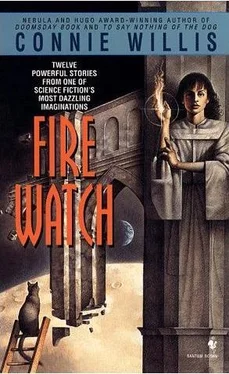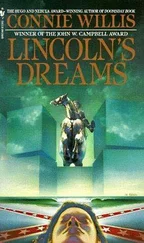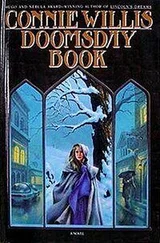“Bloody communists,” Bence-Jones said. “Helping Hitler, they are. Talking against the king, stirring up trouble in the shelters. Traitors, that’s what they are.”
“They love England same as you,” the char said.
“They don’t love nobody but themselves, bloody selfish lot. I wouldn’t be surprised to hear they were ringing Hitler up on the telephone,” Bence-Jones said. “Ello, Adolf, here’s where to drop the bombs.”
The kettle on the gas ring whistled. The char stood up and poured the hot water into a chipped teapot, then sat back down. “Just because they speak their minds don’t mean they’d burn down old St. Paul’s, does it now?”
“Of course not,” Langby said, coming down the stairs. He sat down and pulled off his boots, stretching his feet in their wool socks. “Who wouldn’t burn down St. Paul’s?”
“The communists,” Bence-Jones said, looking straight at him, and I wondered if he suspected Langby too.
Langby never batted an eye. “I wouldn’t worry about them if I were you,” he said. “It’s the jerries that are doing their bloody best to burn her down tonight. Six incendiaries so far, and one almost went into that great hole over the choir.” He held out his cup to the char, and she poured him a cup of tea.
I wanted to kill him, smashing him to dust and rubble on the floor of the crypt while Bence-Jones and the char looked on in helpless surprise, shouting warnings to them and the rest of the watch. “Do you know what the communists did?” I wanted to shout. “Do you? We have to stop him.” I even stood up and started toward him as he sat with his feet stretched out before him and his asbestos coat still over his shoulders.
And then the thought of the Gallery drenched in gold, the communist coming out of the tube station with the package so casually under his arm, made me sick with the same staggering vertigo of guilt and helplessness, and I sat back down on the edge of my cot and tried to think what to do.
They do not realize the danger. Even Bence-Jones, for all his talk of traitors, thinks they are capable only of talking against the king. They do not know, cannot know, what the communists will become. Stalin is an ally. Communists mean Russia. They have never heard of Karinsky or the New Russia or any of the things that will make “communist” into a synonym for “monster.” They will never know it. By the time the communists become what they became, there will be no fire watch. Only I know what it means to hear the name “communist” uttered here, so carelessly, in St. Paul’s.
A communist. I should have known. I should have known.
December 22— Double watches again. I have not had any sleep and I am getting very unsteady on my feet. I nearly pitched into the chasm this morning, only saved myself by dropping to my knees. My endorphin levels are fluctuating wildly; and I know I must get some sleep soon or I will become one of Langby’s walking dead, but I am afraid to leave him alone on the roofs, alone in the church with his communist party leader, alone anywhere. I have taken to watching him when he sleeps.
If I could just get hold of an artificial, I think I could induce a trance, in spite of my poor condition. But I cannot even go out to a pub. Langby is on the roofs constantly, waiting for his chance. When Enola comes again I must convince her to get the brandy for me. There are only a few days left.
December 28— Enola came this morning while I was on the west porch, picking up the Christmas tree. It has been knocked over three nights running by concussion. I righted the tree and was bending down to pick up the scattered tinsel when Enola appeared suddenly out of the fog like some cheerful saint. She stooped quickly and kissed me on the cheek. Then she straightened up, her nose red from her perennial cold, and handed me a box wrapped in colored paper.
“Merry Christmas,” she said. “Go on then, open it. It’s a gift.”
My reflexes are almost totally gone. I knew the box was far too shallow for a bottle of brandy Nevertheless. I believed she had remembered, had brought me my salvation. “You darling,” I said, and tore it open.
It was a muffler. Gray wool. I stared at it for fully half a minute without realizing what it was. “Where’s the brandy?” I said.
She looked shocked. Her nose got redder and her eyes started to blur. “You need this more. You haven’t any clothing coupons and you have to be outside all the time. It’s been so dreadful cold.”
“I needed the brandy,” I said angrily.
“I was only trying to be kind,” she started, and I cut her off.
“Kind?” I said. “I asked you for brandy. I don’t recall ever saying I needed a muffler.” I shoved it back at her and began untangling a string of colored lights that had shattered when the tree fell.
She got that same holy martyr look Kivrin is so wonderful at. “I worry about you all the time up here,” she said in a rush. “They’re trying for St. Paul’s, you know. And it’s so close to the river. I didn’t think you should be drinking. I-it’s a crime when they’re trying so hard to kill us all that you won’t take care of yourself. It’s like you’re in it with them. I worry someday I’ll come up to St. Paul’s and you won’t be here.”
“Well, and what exactly am I supposed to do with a muffler? Hold it over my head when they drop the bombs?”
She turned and ran, disappearing into the gray fog before she had gone down two steps. I started after her, still holding the string of broken lights, tripped over it, and fell almost all the way to the bottom of the steps.
Langby picked me up. “You’re off watches,” he said grimly.
“You can’t do that,” I said.
“Oh, yes, I can. I don’t want any walking dead on the roofs with me.”
I let him lead me down here to the crypt, make me a cup of tea, put me to bed, all very solicitous. No indication that this is what he has been waiting for. I will lie here till the sirens go. Once I am on the roofs he will not be able to send me back without seeming suspicious. Do you know what he said before he left, asbestos coat and rubber boots, the dedicated fire watcher? “I want you to get some sleep.” As if I could sleep with Langby on the roofs. I would be burned alive.
December 30— The sirens woke me, and old Bence-Jones said, “That should have done you some good. You’ve slept the clock round.”
“What day is it?” I said, going for my boots.
“The twenty-ninth,” he said, and as I dived for the door. “No need to hurry. They’re late tonight. Maybe they won’t come at all. That’d be a blessing, that would. The tides out.”
I stopped by the door to the stairs, holding on to the cool stone. “Is St. Paul’s all right?”
“She’s still standing,” he said. “Have a bad dream?”
“Yes,” I said, remembering the bad dreams of all the past weeks-the dead cat in my arms in St. John’s Wood, Langby with his parcel and his Worker under his arm, the fire watch stone garishly lit by Christ’s lantern. Then I remembered I had not dreamed at all. I had slept the kind of sleep I had prayed for, the kind of sleep that would help me remember.
Then I remembered. Not St. Paul’s, burned to the ground by the communists. A headline from the dailies. “Marble Arch hit. Eighteen killed by blast.” The date was not clear except for the year. 1940. There were exactly two more days left in 1940. I grabbed my coat and muffler and ran up the stairs and across the marble floor.
“Where the hell do you think you’re going?” Langby shouted to me. I couldn’t see him.
“I have to save Enola,” I said, and my voice echoed in the dark sanctuary. “They’re going to bomb Marble Arch.”
Читать дальше












